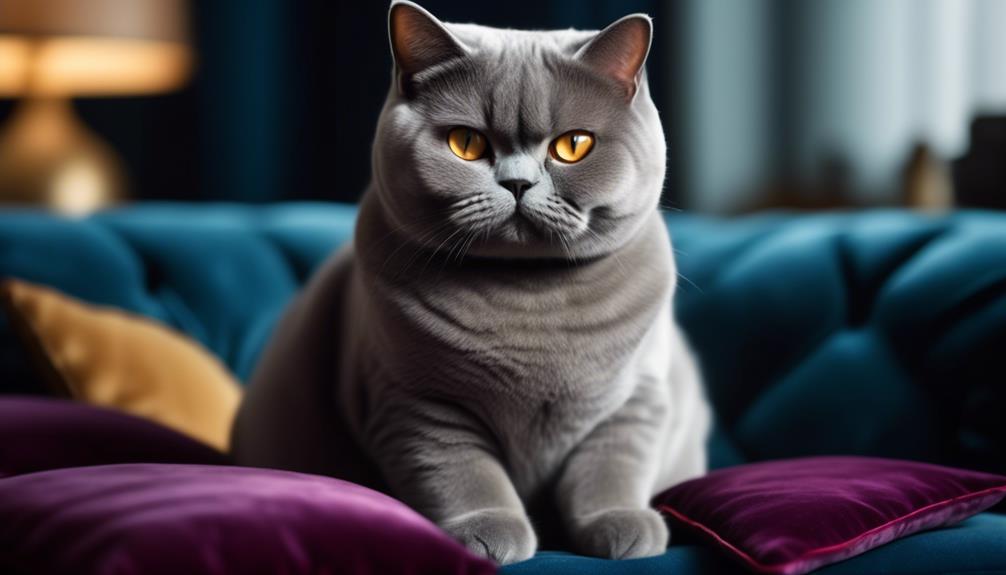
The British Shorthair cat breed is a fascinating subject to explore, as it encompasses a variety of captivating information and characteristics.
From its origins in the United Kingdom to its unique size and temperament, there is much to learn about these enigmatic felines.
With their plush coats, gentle demeanor, and compatibility with other pets, the British Shorthair has captured the hearts of many cat enthusiasts.
But that’s just the beginning; there are still numerous intriguing aspects, such as tips for choosing the perfect British Shorthair and the essential grooming and health care required.
So, let us embark on this journey together and discover the captivating world of the British Shorthair cat breed.
Key Takeaways
- British Shorthair cats have a gentle and laid-back temperament, making them great companions for everyone, including other pets.
- They are affectionate with their family and tolerate being held for cuddles.
- British Shorthairs have a moderate shedding coat that is short, dense, and plush, requiring regular brushing for grooming.
- Choosing a reputable breeder who prioritizes health and temperament and conducts necessary health screenings for the breed is important.
Origin and Size
The British Shorthair cat breed originated in the United Kingdom and is known for its medium to large size.
These cats have a sturdy and muscular build, with males weighing between 12 to 20 pounds and females weighing between 8 to 14 pounds.
Their substantial size gives them a strong appearance.
The breed’s size is a notable characteristic that sets them apart from other cat breeds.
Despite their size, British Shorthairs have a gentle and laid-back temperament, making them affectionate and easygoing companions.
Their medium to large size and calm nature make them a popular choice for families and individuals looking for a loving and low-maintenance pet.
See another cat breed profile.
Burmese Cat Breed
Breed Group and Lifespan
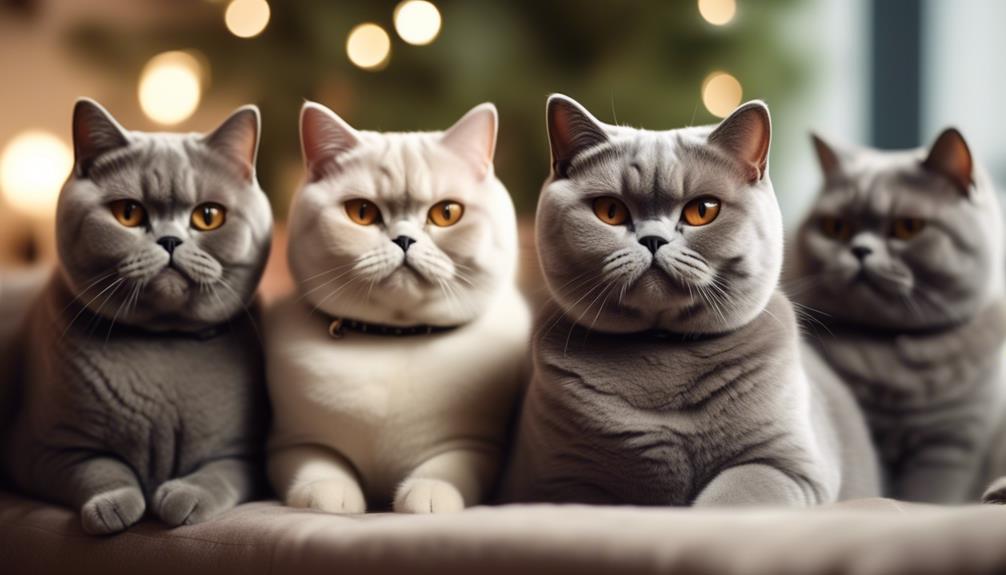
British Shorthair cats belong to the breed group of short-haired cats and have an average lifespan of 12 to 16 years.
This breed group is known for its short, dense, plush coat.
British Shorthairs are medium to large-sized cats, with males weighing between 12 to 20 pounds and females weighing between 8 to 14 pounds.
Their mellow and easygoing personality makes them gentle and affectionate companions.
These cats enjoy being around their human family members and have a quiet voice.
They are also known for their moderate activity level.
The table below highlights the key characteristics of the British Shorthair breed group:
| Breed Group | Lifespan |
|---|---|
| Short hair | 12-16 years |
With their unique characteristics and relatively long lifespan, British Shorthairs make wonderful companions for those seeking a loving and low-maintenance pet.
Coat Characteristics
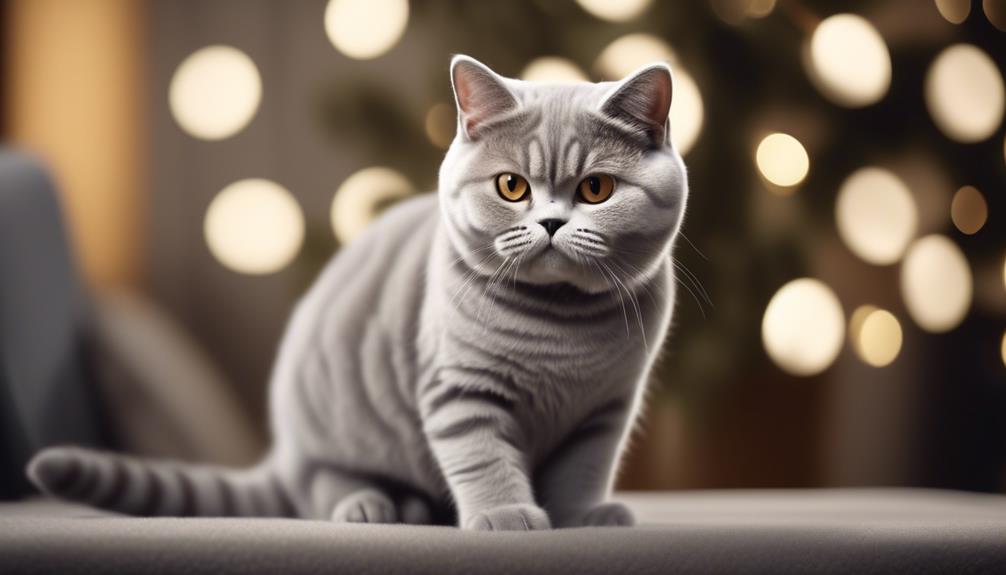
Moving on to the characteristics of the British Shorthair’s coat, this breed is known for its distinctive features that set it apart from other cat breeds.
Here are three key characteristics of the British Shorthair’s coat:
1) Dense and Plush: The British Shorthair’s coat is dense and plush, giving it a soft and cuddly appearance.
This thick coat provides them with insulation and helps protect them from the elements.
2) Variety of Colors and Patterns: British Shorthairs come in a wide range of colors and patterns, including solid colors, tabby patterns, and tortoiseshells.
This variety allows owners to choose a coat color that suits their preferences.
3) Teddy Bear Appearance: The British Shorthair’s coat, combined with their round face and chubby cheeks, gives them a teddy bear-like appearance.
Their coat adds to their adorable and huggable appeal, making them a favorite among cat lovers.
Temperament Overview
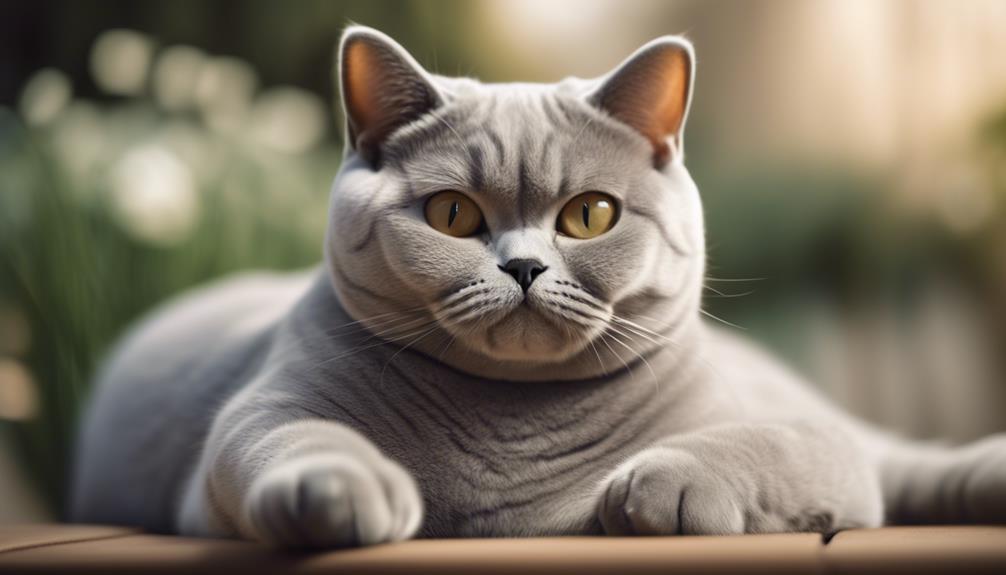
What are the key characteristics of the British Shorthair’s temperament?
The British Shorthair is known for its gentle, affectionate, and laid-back temperament.
This breed makes a reserved and quiet companion, getting along well with everyone, including other pets.
The British Shorthair tolerates being held for cuddles and is affectionate with its family.
While they have a moderate shedding level, they are generally healthy cats.
They also have the potential for playfulness and may tend to vocalize.
When choosing a British Shorthair, it is recommended to prioritize adoption from rescue organizations or shelters.
If purchasing from a breeder, thorough research should be conducted to ensure health and temperament.
Reputable breeders who prioritize necessary health screenings should be sought out, along with providing a nurturing environment for the cats.
Compatibility With Other Pets
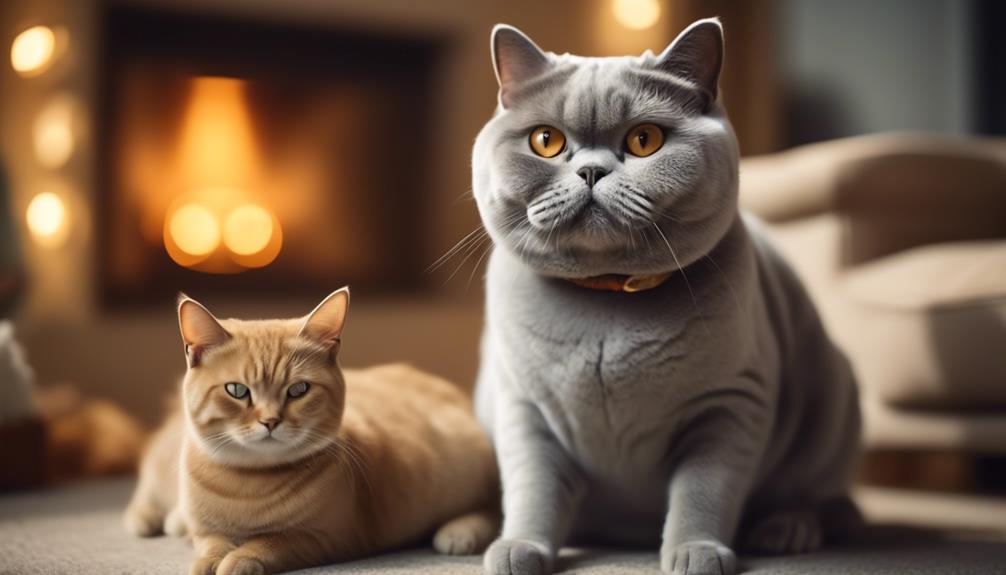
Regarding living with other pets, the British Shorthair cat breed is known for its compatibility and ability to get along well with furry companions.
Here are three reasons why the British Shorthair is a great pet to have alongside other animals:
- Easygoing Nature: The British Shorthair has a mellow and easygoing personality, making it less likely to behave aggressively towards other pets. They are generally tolerant and accepting of other animals, making them a great addition to a multi-pet household.
- Adaptability: British Shorthairs are known for their adaptability. Whether it’s a dog, another cat, or even smaller pets like rabbits or guinea pigs, these cats can adjust and live harmoniously with various animals.
- Laid-back Attitude: These cats have a quiet voice and are undemanding companions. Their laid-back attitude helps them maintain a calm and peaceful environment, reducing the chances of conflict with other pets.
With their friendly and accommodating nature, British Shorthairs can bring joy and companionship to their human owners and furry friends.
Affectionate Nature
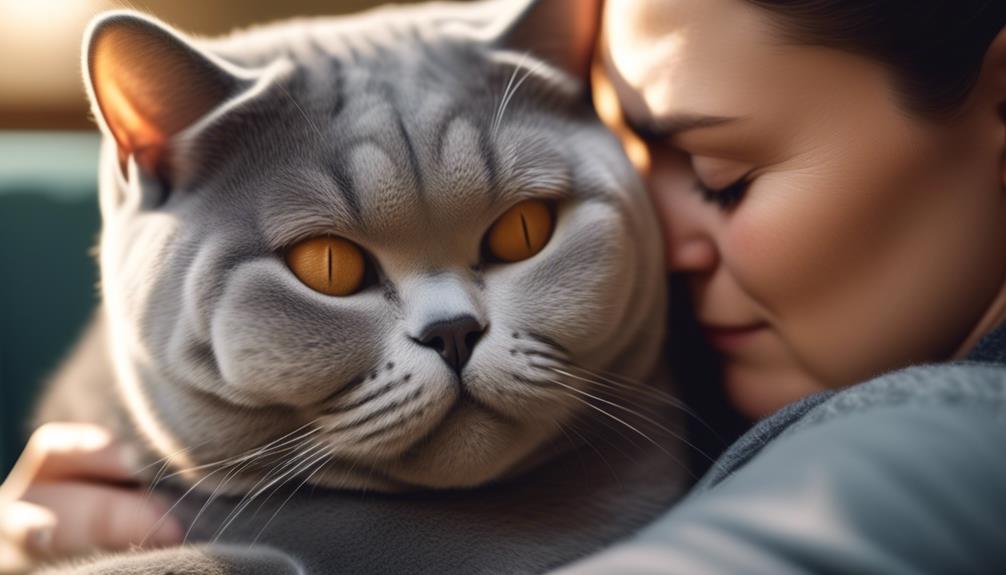
The British Shorthair cat breed is known for its affectionate nature and loving demeanor towards its human companions.
These cats are gentle and laid-back, making them reserved but quiet companions.
They get along well with everyone, including other pets, and tolerate being held for cuddles.
British Shorthairs are affectionate with their family members, forming strong bonds with them.
While they have a moderate shedding level, their general health considerations are relatively low.
These cats have the potential for playfulness and may vocalize from time to time.
When choosing a British Shorthair, it is recommended to prioritize adopting from rescue organizations or shelters.
Conduct thorough research when purchasing from a breeder, ensuring they prioritize health and temperament.
Shedding and Health Considerations
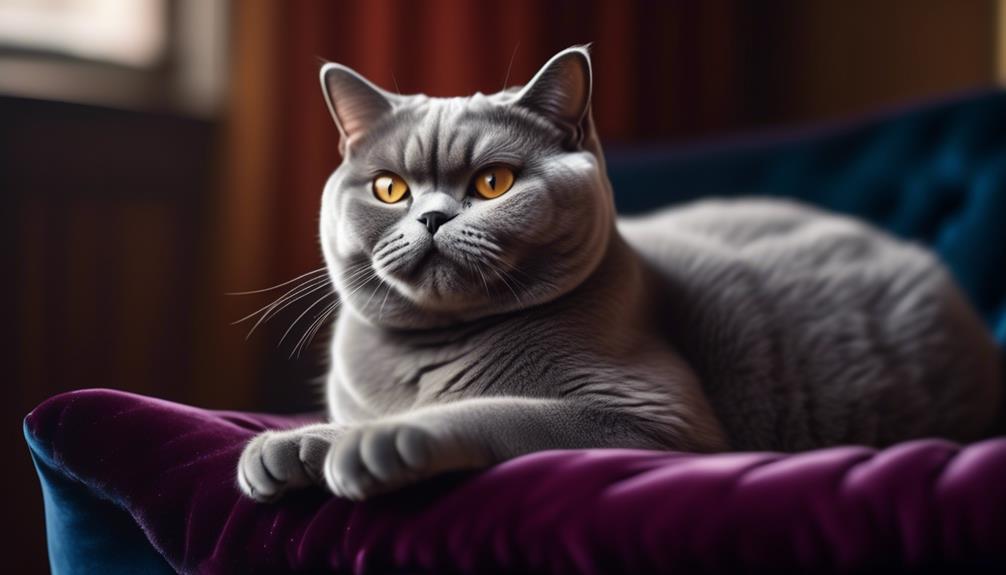
Shedding and health considerations are important aspects regarding the British Shorthair cat breed.
Here are three key points to keep in mind:
- Shedding: British Shorthairs have short coats, but they still shed moderately. Regular brushing can help minimize loose hair and keep their coat looking sleek. However, it’s important to note that shedding is a natural process for all cats, and some level of hair around the house is to be expected.
- Health: British Shorthairs are generally a healthy breed. However, like any cat, they can be prone to certain genetic health conditions such as gingivitis, hypertrophic cardiomyopathy, and polycystic kidney disease. Choosing a reputable breeder who conducts necessary health screenings is essential to minimize the risk of these conditions.
- Care: Maintaining the health of your British Shorthair includes regular dental hygiene to prevent periodontal disease, weekly nail trimming, and cleaning of eyes and ears. Keeping the litter box clean and providing a nurturing environment are important factors in their overall well-being.
Tips for Choosing a British Shorthair
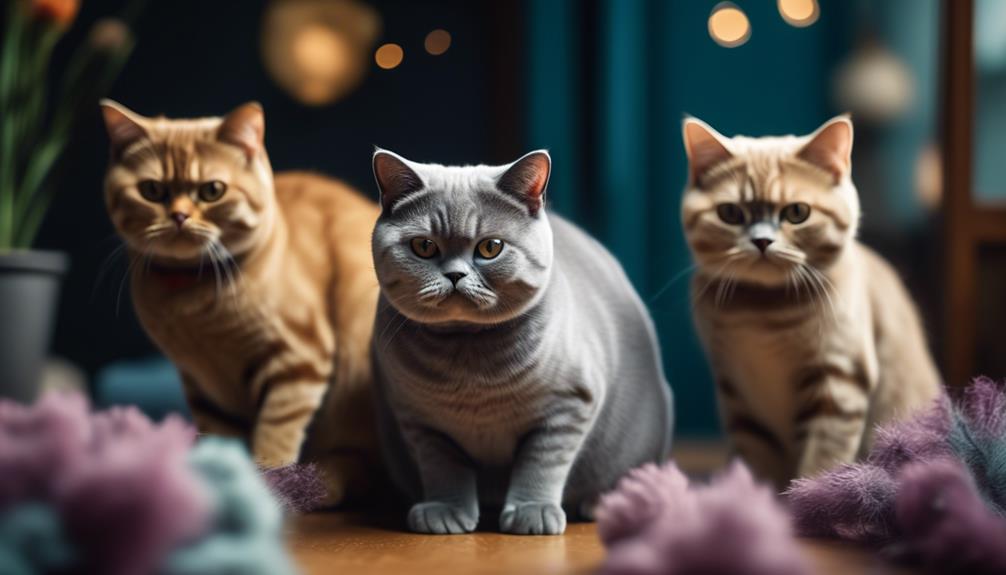
To ensure a successful adoption or purchase, it is essential to consider several factors when choosing a British Shorthair cat.
Firstly, prioritize adopting from rescue organizations or shelters, as there are many cats in need of loving homes.
If purchasing from a breeder, conduct thorough research and choose a reputable one that prioritizes health and temperament.
Look for breeders that conduct necessary health screenings to ensure the cat’s well-being.
Additionally, it is crucial to provide a nurturing environment for the cats, with plenty of love, care, and attention.
Exercise Needs and Trainability
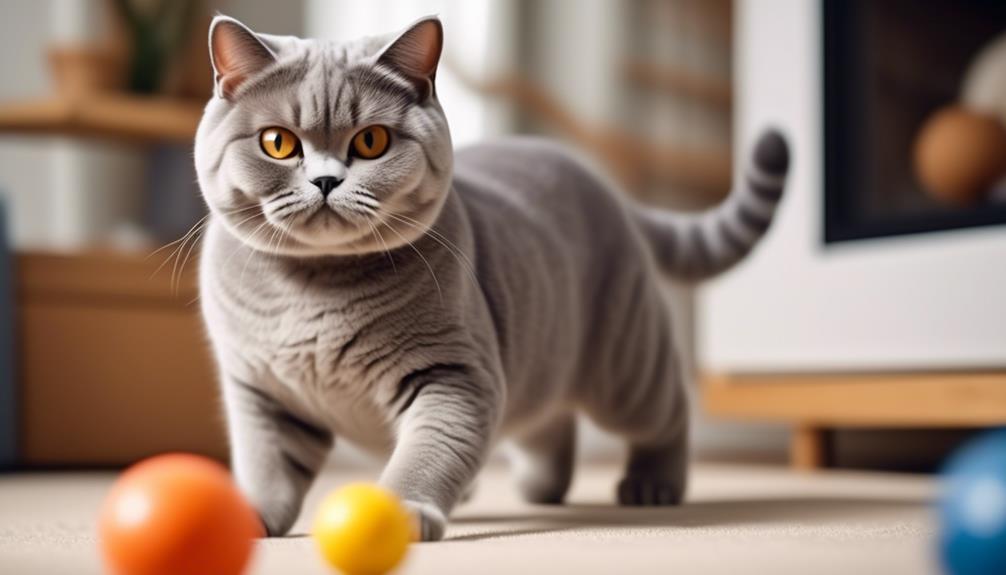
Exercise is an important aspect of caring for a British Shorthair cat, as it helps maintain their overall health and well-being.
Although they have a moderate activity level, it is still crucial to provide them with regular exercise to prevent obesity and keep them mentally stimulated.
Here are three ways to meet their exercise needs and enhance their trainability:
- Playtime: Engage in interactive play sessions with toys, encouraging them to chase, pounce, and jump. This provides physical exercise and strengthens the bond between you and your cat.
- Puzzle toys: British Shorthairs are intelligent cats that enjoy problem-solving. Use puzzle or treat-dispensing toys to challenge their minds and keep them mentally sharp.
- Training sessions: Despite their independent nature, British Shorthairs can be trained to perform tricks or respond to commands. Use positive reinforcement techniques, such as treats and praise, to motivate and reward their good behavior. Consistency and patience are key when training this breed.
Grooming and Health Care
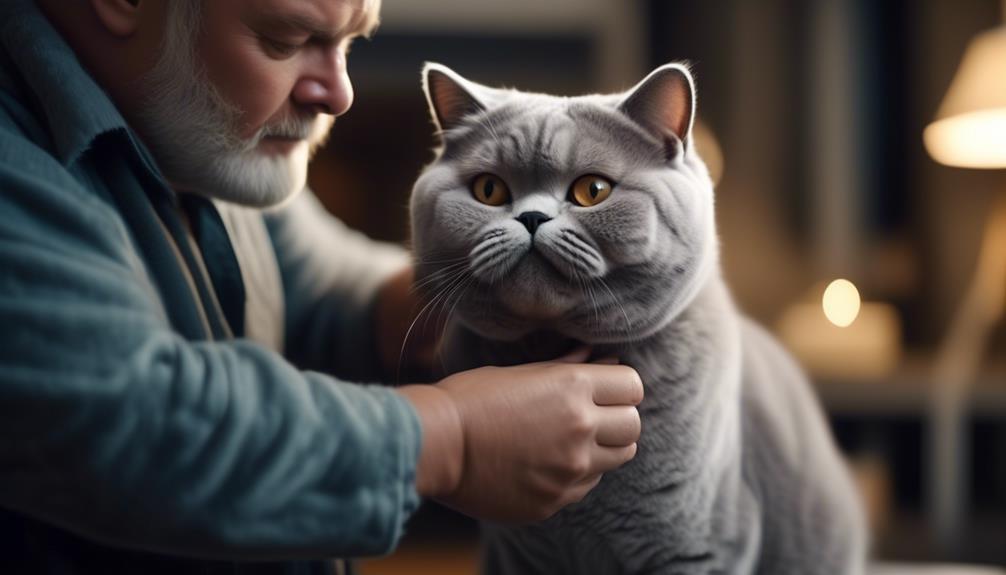
Maintaining the grooming and health care of a British Shorthair cat is essential for their overall well-being and longevity.
These cats have a short, dense, plush coat that requires regular brushing or combing to prevent matting and minimize shedding.
Bathing is rarely necessary unless the cat gets particularly dirty.
Additionally, it is important to prioritize dental hygiene to prevent periodontal disease, as British Shorthairs are prone to gingivitis.
Trimming the nails and cleaning the eyes and ears every week is also recommended.
In terms of health care, British Shorthairs are predisposed to certain genetic health conditions such as hypertrophic cardiomyopathy and polycystic kidney disease.
Regular veterinary check-ups and screenings are crucial to catch any potential health issues early and ensure a long and healthy life for the cat.
Size, Personality, and Coat Appearance
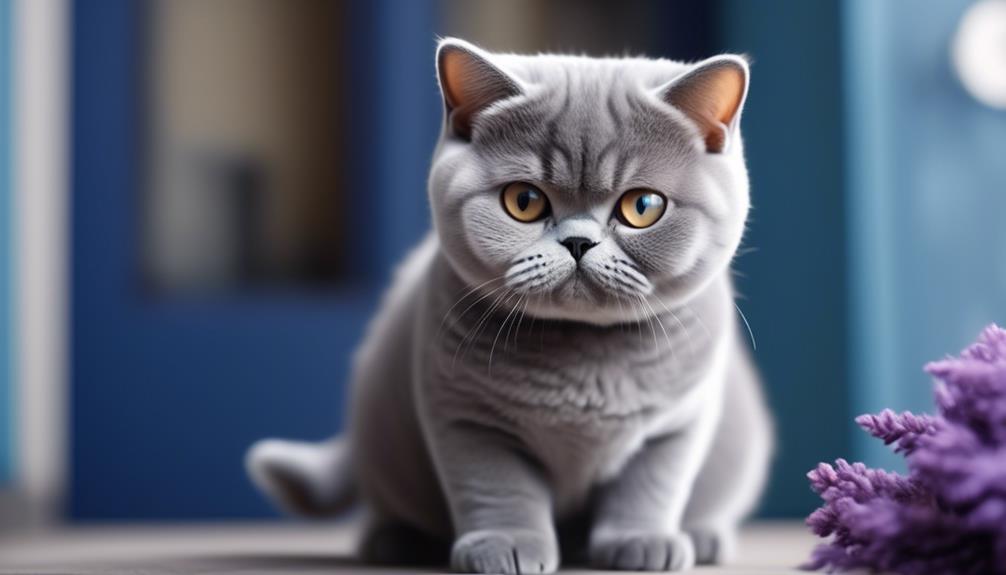
When considering the overall characteristics of a British Shorthair cat, it is important to consider their size, personality, and distinctive coat appearance.
Size: British Shorthairs are medium to large-sized cats. Males typically weigh between 12 to 20 pounds, while females weigh around 8 to 14 pounds.
They have a solid and muscular build, giving them a substantial presence.
Personality: These cats have a mellow and easygoing personality.
They enjoy affection and are known to follow their owners around the house. British Shorthairs have a quiet voice and are undemanding companions.
They have a moderate activity level and are content with a calm and stable environment.
Coat Appearance: The British Shorthair is known for its short, thick coat, which comes in various colors and patterns.
Their coat resembles that of a cuddly teddy bear. The dense fur gives them a plush appearance and requires minimal grooming.
Frequently Asked Questions
Are British Shorthair Cats Hypoallergenic?
British Shorthair cats are not hypoallergenic.
While their short, dense coat reduces the dander they produce, they still produce allergens.
Allergic reactions can still occur in individuals sensitive to cat allergens.
How Often Should I Take My British Shorthair to the Vet?
Regular veterinary check-ups are essential for maintaining the health and well-being of your British Shorthair.
Taking them to the vet at least once a year for routine examinations, vaccinations, and preventive care is recommended.
Can British Shorthair Cats Be Trained to Do Tricks?
British Shorthair cats can be trained to do tricks to a certain extent.
While they may not be as responsive as some other breeds, they can learn basic commands and perform simple tricks with patience and positive reinforcement.
Do British Shorthair Cats Require a Special Diet?
British Shorthair cats do not require a special diet, but it is important to provide them with a balanced and nutritious diet that meets their needs.
Consult a veterinarian to determine the best diet for your British Shorthair cat.
How Long Can British Shorthair Cats Be Left Alone During the Day?
British Shorthair cats can be left alone for several hours during the day, as they are independent and generally do well with some alone time.
However, it is important to provide them with mental stimulation and ensure their basic needs are met.
Conclusion
In conclusion, the British Shorthair is a medium to large-sized cat breed from the United Kingdom.
Its short, dense, plush coat, gentle temperament, and compatibility with other pets make it a wonderful companion.
When choosing a British Shorthair, it is important to consider adoption from rescue organizations or reputable breeders.
These cats require moderate exercise, regular grooming, and optimum care to lead a healthy and fulfilling life.




